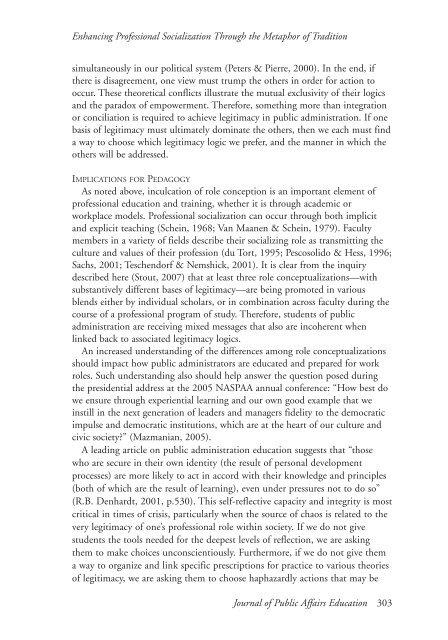JOURNAL OF PUBLIC AFFAIRS EDUCATION - naspaa
JOURNAL OF PUBLIC AFFAIRS EDUCATION - naspaa
JOURNAL OF PUBLIC AFFAIRS EDUCATION - naspaa
Create successful ePaper yourself
Turn your PDF publications into a flip-book with our unique Google optimized e-Paper software.
Enhancing Professional Socialization Through the Metaphor of Tradition<br />
simultaneously in our political system (Peters & Pierre, 2000). In the end, if<br />
there is disagreement, one view must trump the others in order for action to<br />
occur. These theoretical conflicts illustrate the mutual exclusivity of their logics<br />
and the paradox of empowerment. Therefore, something more than integration<br />
or conciliation is required to achieve legitimacy in public administration. If one<br />
basis of legitimacy must ultimately dominate the others, then we each must find<br />
a way to choose which legitimacy logic we prefer, and the manner in which the<br />
others will be addressed.<br />
IMPLICATIONS FOR PEDAGOGY<br />
As noted above, inculcation of role conception is an important element of<br />
professional education and training, whether it is through academic or<br />
workplace models. Professional socialization can occur through both implicit<br />
and explicit teaching (Schein, 1968; Van Maanen & Schein, 1979). Faculty<br />
members in a variety of fields describe their socializing role as transmitting the<br />
culture and values of their profession (du Tort, 1995; Pescosolido & Hess, 1996;<br />
Sachs, 2001; Teschendorf & Nemshick, 2001). It is clear from the inquiry<br />
described here (Stout, 2007) that at least three role conceptualizations—with<br />
substantively different bases of legitimacy—are being promoted in various<br />
blends either by individual scholars, or in combination across faculty during the<br />
course of a professional program of study. Therefore, students of public<br />
administration are receiving mixed messages that also are incoherent when<br />
linked back to associated legitimacy logics.<br />
An increased understanding of the differences among role conceptualizations<br />
should impact how public administrators are educated and prepared for work<br />
roles. Such understanding also should help answer the question posed during<br />
the presidential address at the 2005 NASPAA annual conference: “How best do<br />
we ensure through experiential learning and our own good example that we<br />
instill in the next generation of leaders and managers fidelity to the democratic<br />
impulse and democratic institutions, which are at the heart of our culture and<br />
civic society” (Mazmanian, 2005).<br />
A leading article on public administration education suggests that “those<br />
who are secure in their own identity (the result of personal development<br />
processes) are more likely to act in accord with their knowledge and principles<br />
(both of which are the result of learning), even under pressures not to do so”<br />
(R.B. Denhardt, 2001, p.530). This self-reflective capacity and integrity is most<br />
critical in times of crisis, particularly when the source of chaos is related to the<br />
very legitimacy of one’s professional role within society. If we do not give<br />
students the tools needed for the deepest levels of reflection, we are asking<br />
them to make choices unconscientiously. Furthermore, if we do not give them<br />
a way to organize and link specific prescriptions for practice to various theories<br />
of legitimacy, we are asking them to choose haphazardly actions that may be<br />
Journal of Public Affairs Education 303
















